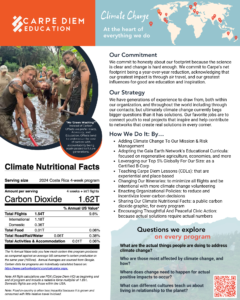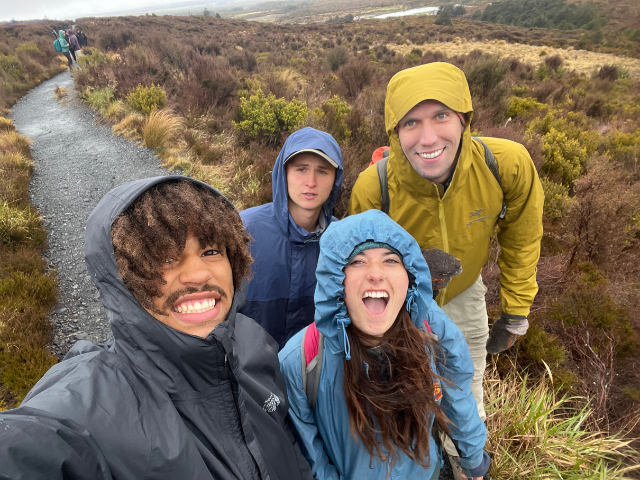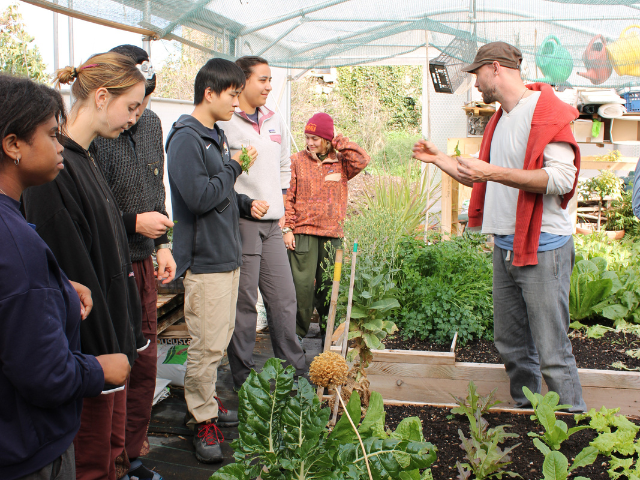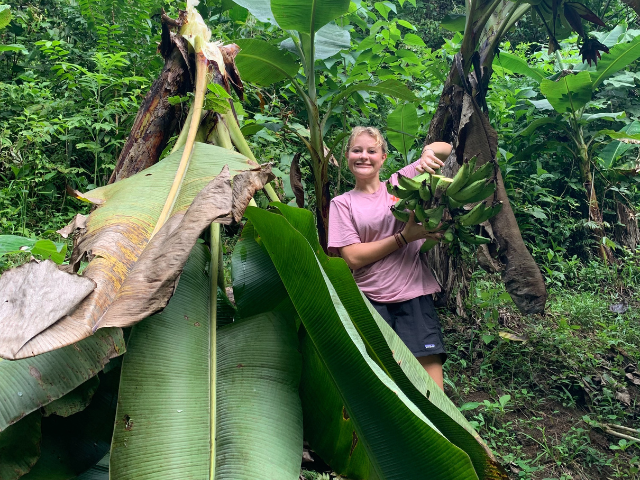Carpe Diem's Answers
While we know there are countless positive outcomes that come from a program like ours, we must also weigh its negative impacts ... especially those related to climate change. We believe in first being open and honest, acknowledging the extra impacts inherent to international travel. We consider these impacts on every program and feel that we have not just a moral obligation, but also a practical one to add to our students’ learning and hopefully inspire positive change locally and back home.
 Our largest carbon footprint is airfare, affecting our students, their families, the communities we visit, and the global community. To reduce and inset our impacts, we’re constantly changing itineraries to be more climate-conscious; we're investing heavily in educational curricula; we're introducing students directly to those impacted by climate change; we're connecting students to our inspirational partners who are making a difference; and we strive to contribute meaningful works on every program. It’s our hope that seeing the real impacts of climate change will connect & inspire further action as our students (future leaders) return to their home communities.
Our largest carbon footprint is airfare, affecting our students, their families, the communities we visit, and the global community. To reduce and inset our impacts, we’re constantly changing itineraries to be more climate-conscious; we're investing heavily in educational curricula; we're introducing students directly to those impacted by climate change; we're connecting students to our inspirational partners who are making a difference; and we strive to contribute meaningful works on every program. It’s our hope that seeing the real impacts of climate change will connect & inspire further action as our students (future leaders) return to their home communities.
This spring of 2025, we are investing heavily in climate adaptation projects such as ground solar installations for rural and remote communities, and continuing our push to urgently address this central issue. Students will create personal Climate Action Plans to research and propose personal ways that can smartly advance solutions - whether as an artist, a musician, an engineer, a teacher, or any other profession - humanity needs us all to contribute in our own way. At the end of the program, students will write to at least three politicians, talking about their experiences and hopes, and exhorting political action: the only significant way to address this existential issue.
Why is this important?
According to the EPA, human activities are responsible for almost all of the greenhouse gas increases over the last 150 years. Greenhouse gasses (GHG) trap heat in the Earth's atmosphere and make the planet warmer. Carbon dioxide (CO2) is the most common greenhouse gas emission, caused especially by burning fossil fuels (for electricity, heat, construction, transportation, and everything that drives our modern economy).
The amount of carbon dioxide a person or group emits due to the consumption of fossil fuels is known as their “carbon footprint.” While the concept of an individual “carbon footprint” was initially pioneered by the fossil fuel industry to shift responsibility to consumers, the reality is that carbon footprints are a necessary tool to work towards net-zero, and a pedagogical tool to educate about climate change. Equally as important however, is the need to be honest about our impacts first: even as airlines become more efficient, increased demand for travel represents roughly 8% of total carbon emissions annually. Americans on average EACH contribute 16 Tons of CO2 per year. By contrast, the average Guatemalan (1.14 Tons/pp/year), Indian (1.8 Tons/pp/year), Thai (3.6 Tons/pp/year), or Italian (5.4 Tons/pp/year) contributes significantly less.
Carpe Diem recognizes that the scale of the problem far exceeds any individual's ability to make a significant impact ... unless it is connected to a larger effort. Thus, our work is aimed at inspiring students through specific experiences of positive change, and ultimately driving community and thus political change, that makes a climate strategy feasible at-scale. At the end of the day, it will be the millions of small and large efforts, inspirations, considerations, regenerative agricultural systems, technological advances, ... and politics, that succeed.
So what to do? Our plan is this:
STEP 1: Be honest and take action: Each of us, … even if it’s a small adjustment.
STEP 2: Talk about our own behavioral changes and research shows two-thirds of listeners will change behavior: Talk about it.
STEP 3: Drive meaningful community & political action through inclusive means: Build allies, listen, and advocate. Don't shame.



Here's what we're doing
From our Pacific Northwest Headquarters
We choose to be headquartered in the Pacific Northwest not only because the people are smart, caring, kind, and solution-oriented, but also because we believe it’s a community moving in the right direction to minimize our carbon footprint. For example: Electricity is largely renewable (OR and WA represent 2 of the top 5 renewable producing states in the US). As well, in our home community of Portland, the trash is only collected every other-week, and recycling/compost weekly.
Actions Across the ENTIRE Organization
We commit to:
- Publish the use of a standard rubric to measure Carbon Nutritional Facts:

- Reduce our entire organization’s Carbon Footprint ethically and inspire others to do the same.
- This will include reducing our footprint as a first priority, then insetting wherever possible, and only for that remaining. We avoid offsetting because it's currently almost impossible to verify ethics, and projects significantly under-sell the cost per ton of carbon to as low as $6/ton, which syphons off good resources and creates the impression of positive change without the impacts.
- Reduce, Reuse, Recycle.
-
- Research and buy used items unless risk management is of concern.
- Buy bulk and “upcycle” office and program materials.
- NO single-use plastics.
- Recycle every battery and prioritize rechargeables.
- Purchase only recyclable envelopes and paper products.
- Bring reusable takeaway/refillable containers when needed.
- Favor vegetarian options for Carpe Diem/Global Routes sponsored meals.
- Recycle or donate all technology not currently in use.
-
- Prioritize hybrid and electric vehicles when renting vehicles or ordering rideshares, when possible.
- Support organizations working toward solutions, such as:
-
- The Glasgow Climate Accords, B-Corps certification, CANiE Accords.
-
- Improve the profile of Climate Change across our brands and influence others to do the same.
- Publish “carbon nutritional facts” for each of our programs.
- Encourage alumni to support climate-related initiatives through messaging, workshops, and scholarships.
Actions In Offices
We commit to:
- Have an in-house position to focus on the issue of climate change (currently, Ethan Knight, Carpe Diem’s Founder, serves in this position).
- To reduce long-haul travel, hire new office employees locally when possible.
- Favor virtual meetings wherever distance necessitates travel, and combine travel obligations to minimize our footprints.
- Allow staff to work remotely, minimizing daily commuting.
- Expect all employees to recycle/reuse all paper products and participate in available recycling programs.
- Use only LED bulbs.
- Maintain low-flow toilets, showers, and faucets fitted with aerators to minimize the amount of water used.
- Continue offering 401k options to Carpe staff that are carbon-conscious.
Actions On Our Programs
We commit to:
- Provide all student groups with rechargeable steri-pens. This alternative purification system allows for safe drinking water without the need for plastic bottled water or disposable filters. During a typical semester this allows us to save over one thousand plastic bottles of water!
- Reduce flights as much as possible; replace with safety-conscious road and rail transportation.
- Encourage students to leave non-essential wifi devices at home, resulting in less energy use.
- Avoid corporate international hotels and restaurants. Instead, support smaller, locally owned businesses.
- Encourage a Sustainability Role (along with others) for students to lead within each cohort.
- Support (with templates and organizing) civic action through dialogue with legislators.
- Include the following questions in our partner and vender vetting:
-
- “Are hybrid or electric vehicles available?”
- “How has climate change affected your community? Do you talk about it much?”
- “Can we learn ho your community is adapting?”
-
- Educate about climate change through project focus and learning outcomes, experience and reflection, and meaningful curricula, resources, and experts.
- Participate in emissions-reducing projects while we travel, independently and on program!
What you can do on your program
- Bring a reusable water bottle, a thermos, reusable straw, and Tupperware for leftover food and takeaway drinks.
- Bring biodegradable soaps / shampoos and other environmentally friendly toiletries (especially reef-safe sunscreen if you are SCUBA diving or snorkeling!).
- Buy or borrow used gear, rather than buy new.
- Refuse plastic bags when purchasing items in stores. Consider bringing a reusable bag.
- Consider reducing meat consumption while traveling.
- Choose snacks with less packaging - reduce waste.
- Be intentional about souvenir purchases to promote buying locally.
- Bring rechargeable batteries.
- Especially in homestays - be conscious of your energy and water use.
- You are a guest in someone else’s country – sometimes in their home. Learn about and respect their customs and culture. Be open to discussions about your own.
Climate Change FAQ
What is carbon offsetting?
Carbon offsetting doesn’t get rid of the carbon dioxide produced when you fly, for instance - but it does try to factor for your share of the CO2 which gets released by (in varying ways) reducing it somewhere else.
Carpe Diem's Official Policy on Carbon Offsets is: "mmmmgurl, naw." That is to say, it looks appealing, but doesn't adequately and objectively consider the impacts. We prefer actual reductions, education, insets through projects.
Flight emissions calculators measure the amount of carbon dioxide produced by each trip you take. When you purchase a carbon offset, you’re typically investing in a project which reduces CO2 levels.
However, carbon offsetting is complicated largely because it doesn’t honestly account for the price of removing a ton of carbon, true accountability for projects is very hard (especially internationally), and the projects are frequently hard to make permanent (think of forest fires burning newly planted trees). Any reputable carbon offset project has to meet three criteria to be considered effective. First, the project wouldn’t have happened if it hadn’t been funded by the money from the carbon offsets. Second, it can’t reduce emissions in one place but somehow increase them in another. Third, it has to be permanent, so it won’t be reversed in the future.
In addition to these criteria, there are other factors to be considered: Is the project taking into account the potential social impacts? For example, there have been a number of cases of large companies buying land in developing countries to use for tree planting and forcing local communities off that land. Not all projects are bad! But it can be tricky to evaluate which ones are truly doing positive, effective work.
How can I offset some of my flights?
Rather than contribute to the larger carbon offsetting industry, Carpe Diem has chosen to support smaller organizations in the places where we work that are working on projects related to renewable energy, environmental justice, or reforestation. By partnering with organizations we know and trust, we are able to not only participate in the projects we fund, we can also have a better understanding of the impact of the funds we spend.
What are some of the organizations you support?
Over the years, we’ve contributed to the following organizations:
Chico Mendes Project Guatemala
What can I do to offset my Carbon Footprint and make this trip balance?
The honest truth is that there is no way you can "offset" the carbon footprint created by your participation in this program. Instead, our calculus is fundamentally this:
- You will emerge a more inspired agent for change, having seen first-hand the impacts of climate change, and connected individually with the people experiencing its affects most.
- You will build relationships that matter - in your cohort of students and through your program contacts. Those relationships will open doors to next orders of good.
- You will personally adjust your diet, living behaviors, and priorities to factor for climate change.
- You will craft a personal Climate Action Plan.
- You will write to at least three politicians to share your experiences, demand immediate climate action, and explain why you think it's important to act.
Again:
- STEP 1: Be honest and take action: Each of us, … even if it’s a small adjustment.
- STEP 2: Talking about our own behavioral changes influences two-thirds of listeners: Talk about it.
- STEP 3: Drive meaningful collective & political action through inclusive means: Build allies, listen, and advocate. Don’t shame.

